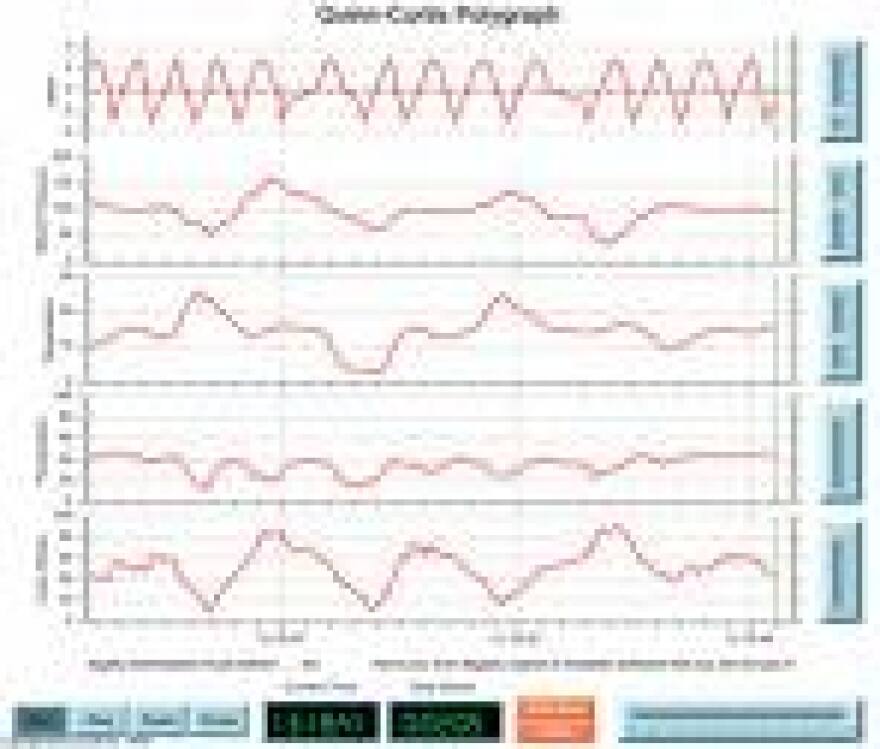By Julie Bierach, KWMU
http://stream.publicbroadcasting.net/production/mp3/kwmu/local-kwmu-729434.mp3
SAINT LOUIS, MO – Since the 1920's lie detection devices have been used in law enforcement work.
Today, many police departments in the St. Louis area have polygraph examiners on staff, most of whom are police officers. And although the polygraph is not accepted by the general scientific community, it is used as a tool in investigating crimes.
The exams are conducted in the St. Louis area as a way of investigating crimes, despite their inadmissibility in court.
Polygraphs measure physiological responses like blood pressure, heart rate and sweat patterns that are believed to change when someone tells a lie.
Detective Randall Combs has been a polygraph examiner with the St. Louis County Police Department for 17 years and a police officer for 25.
"A lie is a deliberate act," said Combs. "And you tell a lie for a specific purpose, to avoid the consequences of the truth. That triggers that fight or flight syndrome, which causes these things to react in ways that I'm trained to interpret whether or not is the truth or a lie."
Each test can take several hours and begins with an interview. The person taking the exam knows every question in advance.
But polygraph exams are a tricky thing. Results of polygraph tests are not allowed to be admitted in Missouri courts, except in very rare instances. But in some states, polygraph results can be used in court.
Bob McCulloch, prosecuting attorney for St. Louis County says the reason why mainstream science has a problem with the polygraph is not necessarily the instrumentation, but who's interpreting the results.
"It not to say that it's completely inaccurate or unreliable by any stretch," said McCulloch, who often calls upon Detective Comb's unit to administer polygraphs to defendants, suspects, or someone providing information about a case, like an eyewitness. "But it certainly doesn't meet the standards that are set out by the law in order to be admissible in court. It's very subject unlike DNA testing for example. It's very susceptible to the subjective determination of the examiner."
Peter Joy is a law professor at Washington University. He's concerned that polygraph examinations conducted by police departments are just a ploy for getting the confession and can often lead to a person falsely confessing to a crime.
"So the person will take the polygraph and then police will tell them that they failed it, even if they've passed the polygraph and then say it will be better for you if you just confess. And it puts some extra pressure on a person to give a confession."
Detective Combs says that is never done and would be unethical.
But polygraphs sometimes do lead to a confession. He remembers one such case in October of 1997 when a 14 month old baby went missing in the Jefferson Barracks area. A massive search ensued and both the mother and father agreed to take a polygraph. Combs conducted the exam and the father, Sean Corbett failed.
"I went in thinking, man, he's probably involved. I mean, burglars just don't break in to steal babies. However, it's probably not something that we think it is. It's probably still, the baby's ok," said Combs. "And it turns out that he does confess, he took the baby out and hung his own child with a jump rope on the back fence."
To avoid the death penalty Sean Corbett pleaded guilty to first degree murder and is serving a life sentence without parole. In that case, the polygraph played a major role.
But Combs says there will always be those who question its use.
"Nobody wants to say it's truthful, but nobody wants to come in here and take a stem test with me and say ok, if I guess the number you picked you give me $10,000. If I don't, you can leave. Nobody will ever take that bet."
A stem test is used to determine if a person will even be susceptible to the exam.
I wanted to take the test.
Detective Combs places several pieces of paper in front of me each with a number. He doesn't know that I pick the number 6. Combs hooks me up to the polygraph and goes through a series of numbers, asking me if that's the number I chose. I reply no to each.
But my deceptive reaction on the polygraphs shows that I picked the number 6 and I fail the exam.
"You were lying, lying, lying," Combs said with a laugh.
Combs and his partner conduct about 260 polygraph exams per year.
The instrument costs about $10,000, and it costs an additional $50,000 - $60,000 to train the examiner.
The St. Louis County Police Department allows municipalities within the county to use the facilities.

